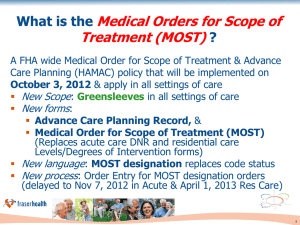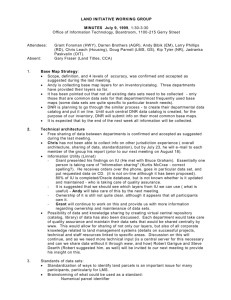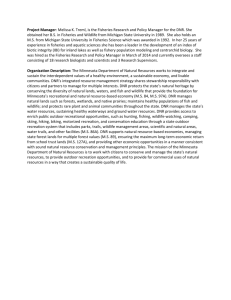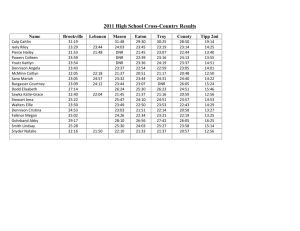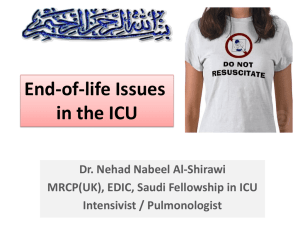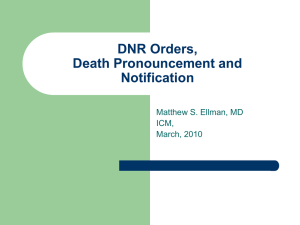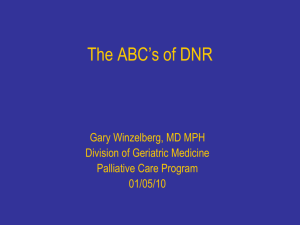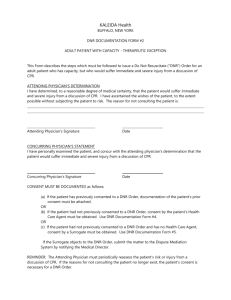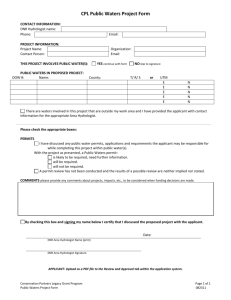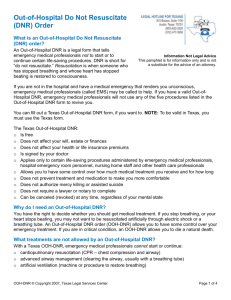DNR Orders: Understanding Do Not Resuscitate
advertisement
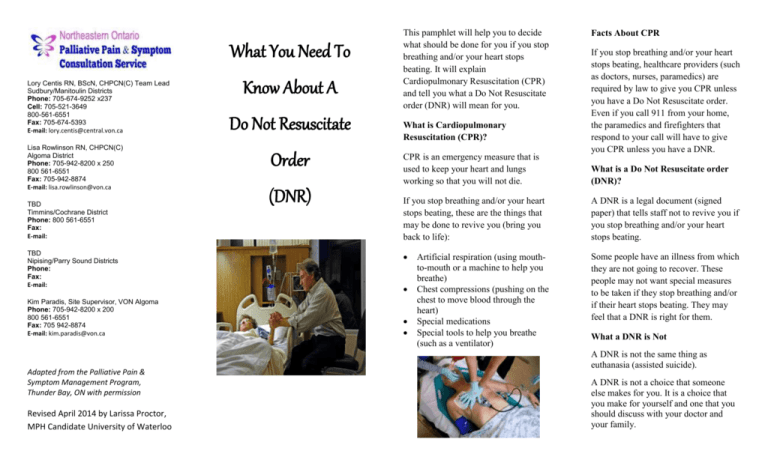
What You Need To Lory Centis RN, BScN, CHPCN(C) Team Lead Sudbury/Manitoulin Districts Phone: 705-674-9252 x237 Cell: 705-521-3649 800-561-6551 Fax: 705-674-5393 E-mail: lory.centis@central.von.ca Lisa Rowlinson RN, CHPCN(C) Algoma District Phone: 705-942-8200 x 250 800 561-6551 Fax: 705-942-8874 E-mail: lisa.rowlinson@von.ca TBD Timmins/Cochrane District Phone: 800 561-6551 Fax: E-mail: TBD Nipising/Parry Sound Districts Phone: Fax: E-mail: Kim Paradis, Site Supervisor, VON Algoma Phone: 705-942-8200 x 200 800 561-6551 Fax: 705 942-8874 E-mail: kim.paradis@von.ca Adapted from the Palliative Pain & Symptom Management Program, Thunder Bay, ON with permission Revised April 2014 by Larissa Proctor, MPH Candidate University of Waterloo Know About A Do Not Resuscitate Order (DNR) This pamphlet will help you to decide what should be done for you if you stop breathing and/or your heart stops beating. It will explain Cardiopulmonary Resuscitation (CPR) and tell you what a Do Not Resuscitate order (DNR) will mean for you. What is Cardiopulmonary Resuscitation (CPR)? CPR is an emergency measure that is used to keep your heart and lungs working so that you will not die. Facts About CPR If you stop breathing and/or your heart stops beating, healthcare providers (such as doctors, nurses, paramedics) are required by law to give you CPR unless you have a Do Not Resuscitate order. Even if you call 911 from your home, the paramedics and firefighters that respond to your call will have to give you CPR unless you have a DNR. What is a Do Not Resuscitate order (DNR)? If you stop breathing and/or your heart stops beating, these are the things that may be done to revive you (bring you back to life): A DNR is a legal document (signed paper) that tells staff not to revive you if you stop breathing and/or your heart stops beating. Some people have an illness from which they are not going to recover. These people may not want special measures to be taken if they stop breathing and/or if their heart stops beating. They may feel that a DNR is right for them. Artificial respiration (using mouthto-mouth or a machine to help you breathe) Chest compressions (pushing on the chest to move blood through the heart) Special medications Special tools to help you breathe (such as a ventilator) What a DNR is Not A DNR is not the same thing as euthanasia (assisted suicide). A DNR is not a choice that someone else makes for you. It is a choice that you make for yourself and one that you should discuss with your doctor and your family. A DNR does not mean that you will not be cared for. Your doctors and nurses will still do everything that they can to make sure you are free of pain and discomfort at the end of life. you with quality care and pay close attention to your comfort. If you have any questions about CPR or DNR, talk to your doctor or nurse. Another Way of Thinking About a DNR Some doctors think that “Do Not Resuscitate” sounds negative or scary, as though something is going to be taken away from you. It might help to think about a DNR a little differently— it is a choice that is being given to you. “Do not resuscitate” is another way of saying “allow a natural death”. It is a plan for the end of life that seeks to provide you with comfort and dignity. Choosing a natural death does not mean that you have to give up your quality of life. Who Decides? It is up to you to decide if a DNR is right for you. Talk with your doctor or nurse to find out more about your illness. This will help you to make an informed choice. You should discuss your choice with your family and your doctor so that everyone knows what your wishes are. If you become too ill to make decisions for yourself, your doctor will ask your substitute decision maker to choose whether or not CPR is right for you. It is best to express your wishes to your family so that the choice is yours. You should also know that this choice is not final. You can change your mind at any time. Whatever you decide, your doctor(s) and nurse(s) will still provide
